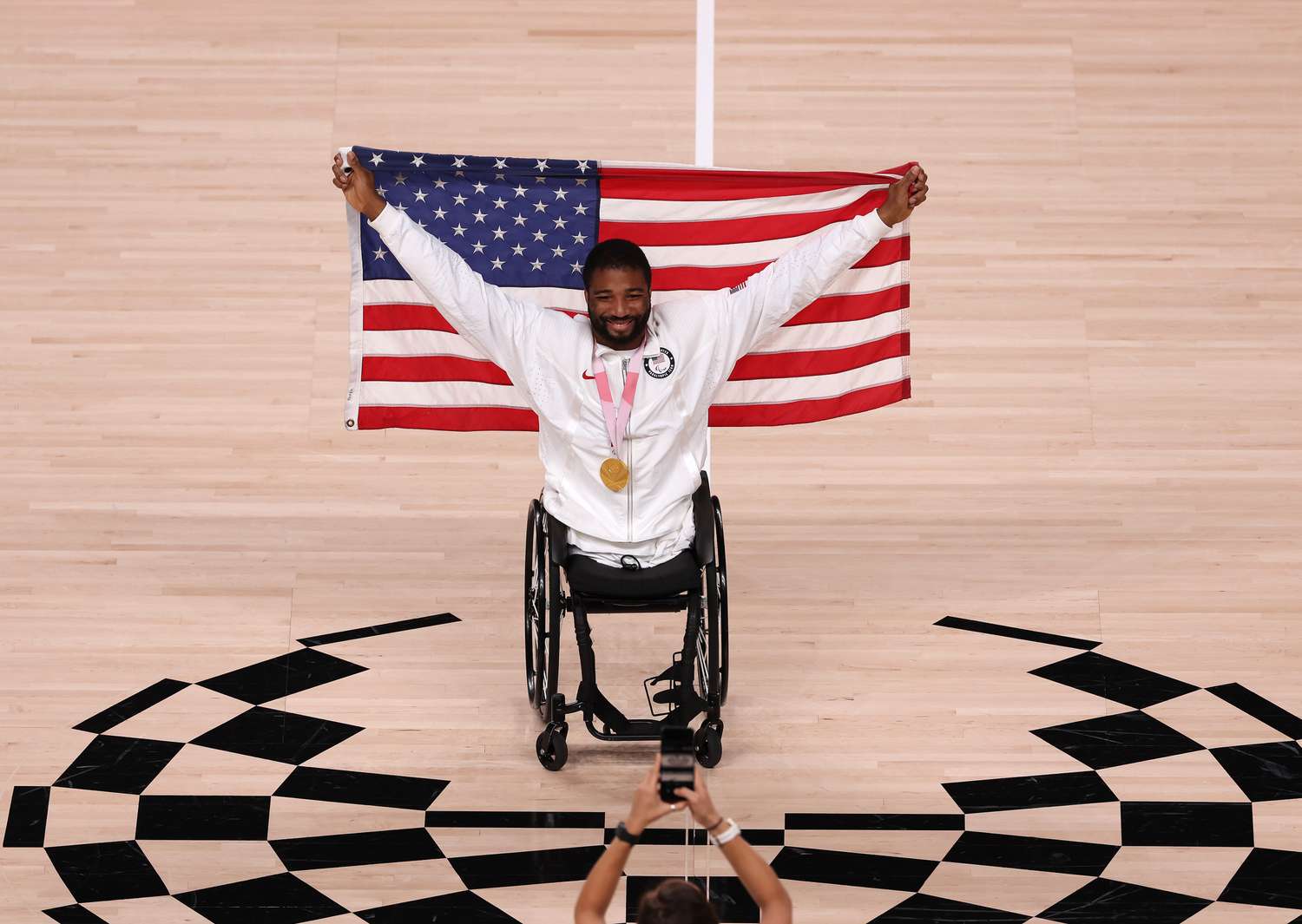Trevon Jennifer is gearing up for this summer’s Paralympics, where he hopes to bring another gold medal to Team USA. But as a father of two, he also fits his training goals around his kids’ schedules, which means he usually hits the gym when his 8-year-old daughter and 4-year-old son are at their extracurricular activities.
“That way, when I’m home, I can be with my kids,” Jennifer says, “because when I’m gone, it might be for four or five days, or maybe two or three weeks, and I want to make sure they get the attention they need.”
Jennifer’s two children and wife, Laura Klass, will accompany her to the Summer Paralympic Games, which run from August 28 to September 8. It will be the first time the family has attended a Paralympic Games together, but it will be the Paralympic wheelchair basketball player’s fourth time competing, having won two gold medals (Tokyo 2020 and Rio 2016) and one bronze medal (London 2012).
The 35-year-old started running track and basketball at just four years old, wrestled in high school and returned to wheelchair basketball in college, and has since become a force for inclusion, showing not only his children but the world that disabilities don’t have to be a barrier.
Throughout his career, Jennifer says many kids in the wheelchair basketball world have told him they felt empowered and inspired to one day make the U.S. National Team. “I also get messages on Instagram and Facebook from parents saying, ‘Hey, my kid has X, Y, Z disability, and when I show my kids what you’ve done and what you’re doing, it inspires them,'” Jennifer says.
A lesson in inclusivity
Jennifer, who is from La Plata, Maryland, and was born without legs, says growing up with a disability often brought her unwanted attention. “I learned a lot through the years of dealing with stares, laughs, points and just about any other way people look at me,” she says. “One of the biggest things I’ve learned is that as parents, what we do is unconsciously train our kids not to engage in very uncomfortable situations.”
Athletes say they’ve heard kids ask their parents, “What happened to that kid?” The parents typically try to remove their kids from the situation or tell them not to ask such questions. “But what we’re subconsciously teaching our kids is that interacting with that weird person is wrong,” Jennifer points out. “For me, I think that’s a teaching moment for them to understand that it’s okay to have a conversation when they see something different and to understand what happened.”
That’s why Jennifer opens up to kids and isn’t shy about sharing his story when asked. He also shows them that he can still do amazing things, like doing a handstand. “It changes the misconceptions people have,” he says. “Now this kid goes through life and thinks, ‘Yeah, I saw someone who might not have legs, but I saw someone who could do some really amazing things in that space.'”
Jennifer acknowledges that, of course, not everyone with a disability will engage in conversation or share their story upon request, but parents can also promote inclusivity by simply exposing their children to a variety of people with different abilities and ensuring diversity is the norm.
Let your kids forge their own path
At home, Jennifer encourages her children to follow their passions in sports, which means giving them the freedom to try different sports and decide what they want to pursue.
His daughter tried soccer, volleyball and jiu-jitsu before discovering her love of Irish dancing. “It’s inspiring for me to see her find her passion, just like I found basketball,” he says. “The way she lights up when she wants to go to practice is something you can’t teach.”
Her son plays soccer, flag football, basketball and t-ball. “He’s just playing every sport and soaking it all up,” Jennifer says. “I can’t wait to see where his passion will take him.”
While Jennifer says she wants her kids to make their own path in basketball, she also believes it’s important for parents to let their kids forge their own path: According to the Child Mind Institute, letting kids explore their interests helps them develop a sense of self, which can boost their confidence.
Understanding Commitment
One thing Jennifer’s career has taught him is that it takes dedication to make your dreams come true.
“As a professional athlete, I’ve missed first words, I’ve missed birthdays, I’ve missed a lot of sporting events, and it’s never easy,” he said, “but I understand that with that level of sacrifice comes great rewards.”
It’s especially hard now that their children are older and can truly understand what it’s like to have a father gone. It takes a whole village, and Jennifer says he couldn’t have done it without a strong support system, especially from his wife, whom he met while attending Edinboro University in Pennsylvania.
“I couldn’t have done it without her. She makes the impossible possible for me,” Jennifer says. “She’s seen me at my lowest and my highest, but she’s the one person who continues to push me to be the best version of myself.”
Through dedication and hard work, Jennifer shows children around the world that no matter what obstacles they face, they can set their own limits.
“There is life beyond disability,” he says, “and I firmly believe we wear many hats. Yes, I am disabled, but I’m also a proud father. I’m a proud full-time employee and a three-time Paralympic medalist. Getting people to understand that disability isn’t just about disability gives me hope.”

